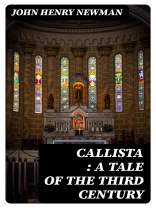In ‘Callista: A Tale of the Third Century, ‘ John Henry Newman artfully weaves a narrative set against the backdrop of early Christian Rome, exploring themes of faith, identity, and moral struggle. The novel employs rich, evocative prose that reflects Newman’s theological insights and aesthetic sensibilities, inviting readers into the nuanced lives of its characters. Through the lens of the titular character, Callista, Newman delves into the complexities of pagan versus Christian worlds, offering a profound commentary on the transformative power of love and belief in an age of religious turbulence. John Henry Newman, a prominent theologian, and philosopher of the 19th century, was deeply influenced by his conversion from Anglicanism to Catholicism. This personal journey informed much of his work, including ‘Callista, ‘ as he sought to articulate the beauty and depth of faith amidst the societal challenges of his time. His academic background, coupled with his passion for eloquent expression, enables Newman to create a richly layered story that resonates on both emotional and intellectual levels. As much a work of theological reflection as a historical novel, ‘Callista’ is highly recommended for those interested in early Christian history and the philosophical discourse surrounding faith. Newman’s lyrical prose and deep insights into human nature make it a compelling read for both scholars and general readers alike, enriching one’s understanding of the spiritual challenges faced in a rapidly changing world.
Об авторе
John Henry Newman (1801-1890) was an eminent 19th-century theologian, poet, and Catholic cardinal whose profound influence on religious thought endures to this day. Born in London, Newman was a major figure in the Oxford Movement, which aimed to return the Church of England to its Catholic roots. His spiritual quest ultimately led him to convert to Catholicism in 1845, making him a cardinal in 1879. Among Newman’s vast body of work is the historical novel ‘Callista: a Tale of the Third Century’ (1855), which reveals his superb narrative skill and intimate understanding of Christianity’s history. This novel, although not as widely known as some of his theological writings, offers insight into Newman’s literary style and engagement with religious themes. The fictional narrative, set in North Africa during Roman times, explores faith and martyrdom, reflecting Newman’s intellectual depth and concern with religious persecution and moral steadfastness. Newman’s literary craftsmanship, coupled with his theological insight, has cemented his reputation as a pivotal figure in English literature and religious studies. His works, including his contributions to poetry and his seminal essay ‘The Idea of a University’, continue to be studied for their lyrical beauty and philosophical richness. Newman was canonized a saint in the Roman Catholic Church in 2019, a testament to the enduring impact of his spiritual legacy.












